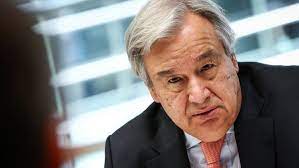United Nations, Jun 17: UN Secretary-General Antonio Guterres strongly criticised the Central African Republic’s security and allied forces in a new report for an “unprecedented increase in hostile threats and incidents” targeting UN peacekeepers and alleged human rights abuses.
His 37-page report to the UN Security Council obtained on Wednesday by The Associated Press said people in the country continue to face an “unacceptably high level of violence”.
He called on President Faustin Archange Touadera to place peace and reconciliation at the heart of his second term “and seize the opportunity to address the root causes of the conflict”.
The mineral-rich Central African Republic has faced deadly inter-religious and inter-communal fighting since 2013.
A peace deal between the government and 14 rebel groups was signed in February 2019, but violence blamed on the country’s former president, Francois Bozize, and his allies threatens to nullify the agreement. It erupted after the constitutional court rejected Bozize’s candidacy to run for president in December.
Touadera won re-election in late December to a second term with 53% of the vote, but he continues to face opposition from forces linked to Bozize.
Last week, the UN Security Council strongly condemned violations of human rights and international humanitarian law in the country and warned that attacks on UN peacekeepers there may constitute war crimes.
At that contentious council meeting, US political coordinator Rodney Hunter expressed outrage at reports that Russian military instructors led military offensives in the country “characterised by confrontations with UN peacekeepers, threats against UN personnel, violations of international humanitarian law, extensive sexual violence, and widespread looting, including of humanitarian organisations.”
Russia’s deputy UN ambassador, Anna Evstigneeva, accused the US of making “baseless allegations” and said the US action, coupled with a campaign in some media, “constitutes a coordinated action aimed at besmirching our effective… Assistance to stabilisation in the CAR”.
Russia and Rwanda have troops in CAR, at the invitation of the government, that have battled rebels. The secretary-general’s report makes repeated references to “national security forces and bilaterally deployed and other security personnel”, including in referring to attacks on peacekeepers, without singling out any “bilateral” country.
Guterres said the security situation in CAR remains “fragile, particularly in the west, northwest and centre of the country, due to continued clashes between armed groups…And national defence forces assisted by bilaterally deployed and other security personnel, resulting in loss of lives and displacement.”
The report gave details on clashes leading to a May 30 border incident that has heightened tensions between the Central African Republic and Chad.
Chad’s defense ministry said troops from CAR attacked a Chadian border post, killing one soldier and kidnapping and then executing five others. Russia’s RIA Novosti news agency reported three Russian military instructors, part of the mission to support the CAR military, were also killed during the operation by a mine explosion.
The secretary-general said there were clashes on May 25 in ex-president Bozize’s stronghold in northwest Ouham prefecture between government and allied forces and other security personnel and elements from the CPC and 3R armed groups that support Bozize. The clashes led people to flee toward nearby Chad and Cameroon.
On May 28, in Bang, which is close to the Chad and Cameroon borders, “national defence forces reportedly arrested and tortured approximately 20 civilians from the Muslim community, including five women, based on their perceived association with 3R combatants,” the report said.
Two days later, on May 30, “3R elements reportedly crossed the border into Chad following clashes near Bang,” the UN chief said. “National defence forces and bilaterally deployed and other security personnel reportedly followed in pursuit, resulting in clashes with Chadian forces and casualties on both sides.”
Guterres said government and allied forces obstructed UN access in Bang on May 30, and “sporadic gunfire in the border area continued on subsequent days.”
According to the UN chief, between February 1 and June 1, the human rights situation in CAR, “deteriorated significantly” and 152 security incidents involving UN personnel were recorded including 12 “hostile attacks,” nine arrests, and 16 cases of “road harassment” by national defence forces.
The UN peacekeeping mission known as MINUSCA documented 344 violations of human rights and international humanitarian law affecting 628 victims and causing 82 conflict-related deaths during that period, the report said.
“MINUSCA documented 140 incidents perpetrated by national and bilaterally deployed and other security personnel, affecting 249 victims, representing an increase of 278.4% and 289%, respectively, compared to the previous period,” the report said.
Guterres said the formation of a new and inclusive government in CAR “will be critical” and he urged the president to ensure that a dialogue being prepared includes armed groups that have renounced violence, civil society, women, youth and religious leaders from all over the country — an to allow “legitimate grievances to be heard and acted upon”. (AGENCIES)
Trending Now
E-Paper


